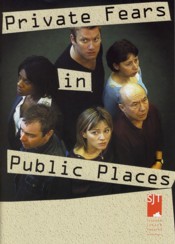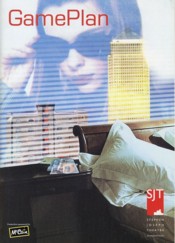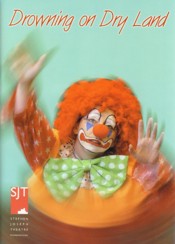
Sir Alan Ayckbourn is a prolific British playwright and director. He has written and produced as of 2024, 90 full-length plays in Scarborough and London and was, between 1972 and 2009, the artistic director of the Stephen Joseph Theatre in Scarborough, where all but four of his plays have received their first performance. More than 40 have subsequently been produced in the West End, at the Royal National Theatre or by the Royal Shakespeare Company since his first hit Relatively Speaking opened at the Duke of York's Theatre in 1967.
Mixed Doubles: An Entertainment on Marriage is a programme consisting of a series of eight short plays or revue sketches, each with two characters, composed by various English playwrights. It was first performed on 6 February 1969 in the Hampstead Theatre Club with the title, We Who Are About To.... The programme was then presented as Mixed Doubles: An Entertainment on Marriage at the Comedy Theatre, London, on 9 April 1969.

Woman in Mind (December Bee) is the 32nd play by English playwright Alan Ayckbourn. It was premiered at the Stephen Joseph Theatre In The Round, Scarborough, in 1985. Despite pedestrian reviews by many critics, strong audience reaction resulted in a transfer to London's West End. The play received its London opening at the Vaudeville Theatre in 1986 where it received predominantly excellent reviews.

The Lyric Theatre is a West End theatre in Shaftesbury Avenue in the City of Westminster. It was built for the producer Henry Leslie, who financed it from the profits of the light opera hit, Dorothy, which he transferred from its original venue to open the new theatre on 17 December 1888.
Bedroom Farce is a 1975 play by British playwright Alan Ayckbourn. It had a London production at the National Theatre in 1977, transferring subsequently to the Prince of Wales Theatre.

Private Fears in Public Places is a 2004 play by British playwright Alan Ayckbourn. The bleakest play written by Ayckbourn for many years, it intimately follows a few days in the lives of six characters, in four tightly-interwoven stories through 54 scenes.

The Revengers' Comedies is a play by Alan Ayckbourn. Its title references that of The Revenger's Tragedy. The play is an epic piece running more than five hours and was designed to be presented in two parts. It was inspired by the playwright's love of films and references many notable movies, particularly the Alfred Hitchcock classic Strangers on a Train.

GamePlan is a 2001 play by British playwright Alan Ayckbourn, the first in a trilogy of plays called Damsels in Distress The darkest of the three plays, it is about a teenage girl who tries to support herself and her mother through prostitution.

Damsels in Distress is a trilogy of plays written in 2001 by British playwright Alan Ayckbourn. The three plays, GamePlan, FlatSpin and RolePlay, were originally performed as a set by the Stephen Joseph Theatre Company (SJT). The plays were written to be performed by the same seven actors using the same set. Although the plays loosely shared some common themes, the three stories were independent of each other and unconnected.

Drowning on Dry Land is a 2004 play by British playwright Alan Ayckbourn, his 66th to be produced. Exploring the culture of B-list celebrities, it is a comedy about the rise and fall of Charlie Conrad, a man apparently famous for being a failure.
Michael Rudman was an American theatre director.

Sugar Daddies is a 2003 play by British playwright Alan Ayckbourn. It is about a student who forms a friendship with a rich man over three times her age, who has a sinister past, and maybe a sinister present too.

Haunting Julia is a 1994 play by British playwright Alan Ayckbourn. It is about Julia Lukin, a nineteen-year-old brilliant musician who committed suicide twelve years earlier, who haunts the three men closest to her, through both the supernatural and in their memories. In 2008, it was presented as the first play of Things That Go Bump.

A Chorus of Disapproval is a 1984 play written by English playwright Alan Ayckbourn.
Derrick John Goodwin was an English theatre and television director, writer and producer.
Things That Go Bump is a season of plays performed in 2008 by British playwright Alan Ayckbourn.

Invisible Friends is a 1989 children's play by the British playwright Alan Ayckbourn. It was written as a starring vehicle for actress Emma Chambers who portrayed the central character of teenager Lucy Baines in the original production at the Stephen Joseph Theatre in Scarborough, North Yorkshire, England for its run in late 1989 and early 1990. Often seen as a companion play to Woman in Mind, Lucy escapes her unhappiness with her own family by reviving her imaginary childhood friend, Zara. Lucy's family, however, do not approve of this imaginative thinking. Zara helps Lucy to make her family invisible, and Lucy feels much happier and is delighted. However, Zara outstays her welcome and soon manipulates Lucy into catering and cleaning for her and her brother Chuck and father Felix before kicking Lucy out. In the end Lucy manages to defeat Zara, Chuck, and Felix and make her family visible again, and they begin to pay more attention to her.
Sir Michael Victor Codron is a British theatre producer, known for his productions of the early work of Harold Pinter, Christopher Hampton, David Hare, Simon Gray and Tom Stoppard. He has been honoured with a Laurence Olivier Award for Lifetime Achievement, and is a stakeholder and director of the Aldwych Theatre in the West End, London.

Neighbourhood Watch is a 2011 play by Alan Ayckbourn. The play premiered on 13 September 2011 at the Stephen Joseph Theatre in Scarborough.
Adrian McLoughlin is a British stage, television and film actor who began his career in 1983. He is best known for his 2017 role as Joseph Stalin in the Armando Iannucci film The Death of Stalin.













